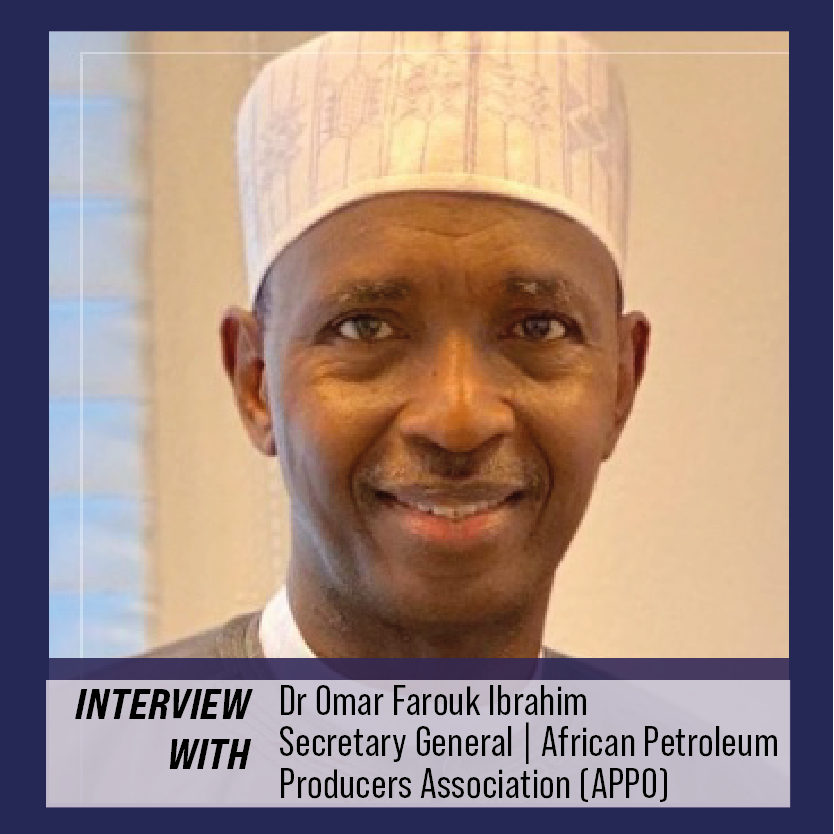
Dr Omar Farouk Ibrahim
Dr Omar Farouk Ibrahim | Secretary General | African Petroleum Producers Association (APPO)
The 5th edition of the Congo International Hydrocarbons Conference, CIEHC, is scheduled to take place from 30th November to 2nd December at the Kintele Conference Center under the theme Congo Energy Transition Opportunities and Challenges. Can you share with us how APPO will be participating at the event and what do you hope to learn from attending?
I should like to begin by congratulating Member Country the Republic of Congo for the steady progress that CIEHC has recorded since it was first inaugurated five years ago. The number of key participants and exhibitors, as well as speakers, has been on the rise from the very first edition, and I believe that the ministry of Hydrocarbons and the organizers deserve commendation for the efforts they have put into raising greater awareness about the prospects in the industry in Congo. Having said that, I would also want to say that the theme: Energy Transition Opportunities and Challenges in the Congo, is a very timely theme given the momentum that that energy transition has taken in recent years.
APPO shall fully participate in this important event as it has always done in the past. We have been invited to give a Keynote Address, and we shall use that opportunity to articulate our position on the global energy transition. We will also have a booth at the event to better communicate our mission to the public and enlighten people about what we do.
APPO Leadership has put in a lot of efforts in creating awareness and exposure globally about APPO activities and as a result, APPO is now well known and positioned within the industry as a leading voice and authority about issues facing the oil and gas industry in Africa. Can you share with us the Organization’s medium-term priorities?
The changes you have noticed in APPO are dictated by the realities of the times. If we had continued to do things the way we had done it from the founding of APPA in 1987, the oil and gas industry in Africa will be on its way to extinction by now. But having realized early in the transition discourse that the economies of most African oil and gas-producing countries are highly dependent on fossil fuels revenue, our Ministers decided that it was very important to reform APPA to be able to address the challenges that the global energy shall pose to African oil and gas producers, and even non-producers alike.
APPO conducted a major study on the future of the oil and gas industry in the light of the energy transition and came to the conclusion that 4 challenges are going to confront the industry as the world pursues the energy transition. These are challenges of finance, technology, markets and expertise.
To address these challenges in the short and medium term, APPO has taken the following initiatives:
- On Funding: Establishment of a continental bank for the energy industry, with a focus on oil and gas projects, especially infrastructure. An MoU to this effect was signed in Luanda last May between APPO and Afreximbank, and negotiations have reached an advanced stage. When established, the AEB shall have USD 6 Billion to start with, even before we have opened our doors to investors.
- On the Technology and expertise Challenge: A team from the APPO Secretariat is currently on missions to Member Countries to evaluate the research, technology, development, innovation and training institutions they have with a view to identifying those that readily be designed and upgraded to APPO regional centers of Oil and gas excellence.
- On markets: APPO believes that Africa has the market to consume much of its energy. What is lacking is the empowerment of that market. With 1.3 billion people, of whom 900 million do not have access to modern energy for cooking or other domestic use, it is misleading to say that Africa has no market. Rather, Africa has not developed the potential market. And to do this APPO is partnering with others to provide the required energy infrastructure that will move energy from areas of plenty to areas of need. We are for example, working with the Central Africa Business Energy Forum CABEF, to have the most ambitious energy infrastructure project on the continent, namely the Central Africa Pipeline System project. This project envisages connecting 11 Central Africa states by pipelines – oil, gas and products.
Considering the global paradigm shift how does APPO see the development of Gas in Member Countries in terms of domestic use as well as export?
Africa has over 500 trillion cubic feet of proven gas reserves but to date over 900 million people lives without access to modern energy for domestic use because the African market is not well developed.
Gas being the cleanest fossil fuel, it is therefore time that Africa appropriates its use to the detriment of firewood which is the most used today. The development of African oil and gas market is the pathway to solve this problem. To achieve this, countries must think about the development of cross-border infrastructures in order to bring products closer to consumers, it being understood that all countries are not producers, but all need gas, crude oil and petroleum products for their industrialization. There is no industry or development without energy.






